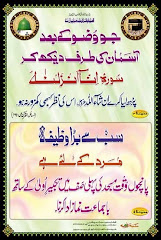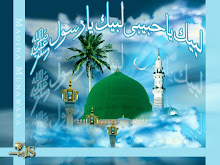Some misguided persons believe that the Holy Prophet (sallal laahu alaihi wasallam) is powerless, that he does not possess the power to give benefit or cause loss to anybody.The belief of the Ahle Sunnah Wal Jama’at is that Sayyiduna Rasoolullah (sallal laahu alaihi wasallam) has been blessed by Allah Ta’ala with the powers to give benefit or loss to anybody if he wishes.
The following verses of the Holy Quran prove this. Allah Ta’ala states in the Holy Quran:
“And if when they do injustice unto their souls, then O Beloved! They should come to you and then beg forgiveness of Allah and the Messenger should intercede for them, then surely, they would find Allah Most Relenting, Merciful.” (Para 5, Ruku 6)
“And what they felt bad, only this that Allah and His Messenger has enriched them out of His grace;” (Para 10, Ruku 16)
“And O Beloved! Remember when you did say to him whom Allah bestowed a favour and you have bestowed a favour.” (Para 22, Ruku 2)
Allah Ta’ala says in the Holy Quran: “And O Beloved, I have sent you not as mercy unto the worlds.” (Part 17 Ruku 7) Commentating on this verse of the Holy Quran, Allama Aaloosi (radi Allahu anhu) has stated, “And the Holy Prophet (sallal laahu alaihi wasallam) being mercy unto the worlds is in this context that throughout the entire universe, his control is present through the Blessing of Allah Ta’ala. This is why the Noor of the Prophet (sallal laahu alaihi wasallam) was the first thing to be created and it is in the Ahadith, ‘ O Jaabir! Almighty Allah had first created the Noor of your Nabi (sallal laahu alaihi wasallam)’ and in the next Hadith it is said that, ‘Almighty Allah is the Giver and I am the distributor. The explanation of the Soofia is more than that of mine in this matter.” (Tafseer Roohul Muaani)
It is mentioned in the Holy Quran that Hazrat ‘Isa (alaihis salaam) made a bird out of clay, blew into it, and then, with the Command of Allah Ta’ala, it began to fly. The Holy Quran also mentions that Hadrat ‘Isa (alaihis salaam) cured the blind, the lepers and brought back the dead back to life with the Command of Allah Ta’ala.
All these incidents prove that Nabi ‘Isa (alaihis salaam) was able to give benefit to those who sought his assistance. How can one dispute that our Nabi Muhammad Mustapha (sallal laahu alaihi wasallam), who is superior to Nabi ‘Isa (alahis salaam), is not in control of giving benefit or loss to anyone?
It is also stated in the Holy Quran that through the Barakah of Hazrat Yusuf (alaihis salaam), Hazrat Yaqoob (alaihis salaam) regained his sight. Is the returning of the sight of Hadrat Yaqoob (alaihis salaam) not a benefit and advantage? Verily it is! Thus, if benefit can be gained through the other Ambiya (alaihimus salaam), how then can a Muslim say that the Holy Prophet (sallal laahu alaihi wasallam) cannot give us benefit or loss?
Once, Hazrat Maghir (radi Allahu anhu) committed a grave sin so he went to the Holy Prophet Muhammad (sallal laahu alaihi wasallam) and asked him to purify him. Although the Sahabi-e-Rasool had sinned against Allah Ta’ala, he asked the Holy Prophet (sallal laahu alaihi wasallam) to purify and cleanse him because he knew that the Holy Prophet (sallal laahu alaihi wasallam) would give benefit to him.
The Holy Prophet (sallal laahu alaihi wasallam) said, “I am the one who distributes and Almighty Allah is the One who gives.” (Bukhari; Umdatul Qari)
Hazrat Rabia (radi Allahu anhu) said in the court of the Holy Prophet (sallal laahu alaihi wasallam): “I ask from you that I may be in Jannah with you.” (Mishkaat; Mirkaat)
It is obvious from these Ahadith that the Holy Prophet (sallal laahu alaihi wasallam) is the one who distributes throughout the universe and he who is a distributor in the entire universe definitely has the power of giving benefit.
From the above narrations, those who are Muslims will always accept that the Holy Prophet (sallal laahu alaihi wasallam) has the power of giving benefit. He will think of him as the one to turn to in the times of need.
SWEET MADINA NEWSLETTER
I LOVE MADINA
CALENDAR
MADINA

Ya Razzaqo

Subhan Allah
Tauba

Very important
Wazoo

Allah Hu
Ya Allah
Allah

Pukaro Ya Rasool Allah

Ya Nabi

Ya Rasool Allah

Ya Allah

Important Dua

Darood Pak

Ya Mustafa

Darood Sharif

Mein Sadqay Ya Rasool Allah

Ya Nabi Allah

ya nabi

islamic

islamic

MADINA

Facebook Badge
WISH FROM HEART
PAKISTANI TIME
Subscribe To My Podcast
Facebook Badge
www.sweetmadina.blogspot.com's Fan Box
RASOOL ALLAH

QURAN SHARIF

ALLAH HU

FARMAN-E-NABI S.A.W

YA NABI ALLAH

PRAY

NEW MESSAGE
IMPORTANT

THE KEY

A MESSAGE
HELPING THE NEEDY

VERY IMPORTANT

SECRET

YA ALLAH MADAD

Blog Archive
-
▼
2009
(28)
-
▼
January
(22)
- Grave warning
- Wonders of Allah in Seeds of Coconut Palm
- Wonders of Allah in Dazzling Pearls
- Wonders of Allah in Water Lilies
- Wonders of Allah in Social System of Ants
- Wonders of Allah in Butterflies
- Human Rights in Islam
- Saying “Ya Rasool’Allah (Sallalahu Alaihi Wassalam...
- MUHAMMAD (SALLAL LAAHU ALAIHI WASALLAM) IS A LAWM...
- What is Islam
- WASEELA
- What is Aashura?
- Hazrat Imam Hussain Lives Forever
- BUKHARI SHARIF & MUSLIM SHARIF THE ONLY SOURCES ...
- Me’raaj - The Greatest Miracle
- Jewels of Quran
- Days To Remember in Moharram-ul-Haram
- WARNING FOR MISSING PRAYERS (NAMAZ)
- سرکار صلی اللہ علیہ وسلم کا جسم اطہر بے سایہ
- Auliya Allah - Friends of Allah
- POWER OF HOLY PROPHET MUHAMMAD (PEACE BE UPON HIM)
- THE BLESSING
-
▼
January
(22)


